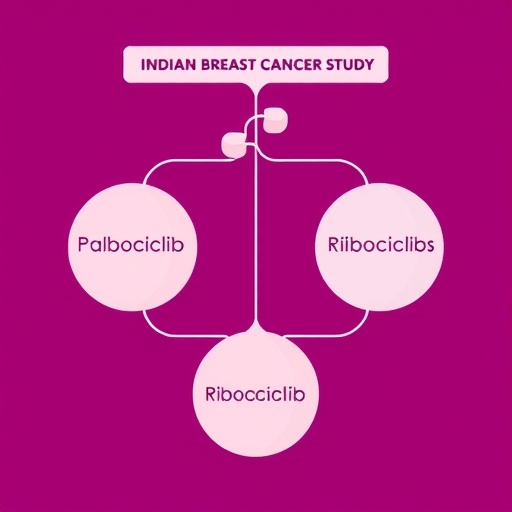In a groundbreaking study emerging from India, researchers have conducted a meticulous head-to-head comparison of two prominent cyclin-dependent kinase 4/6 (CDK4/6) inhibitors—Palbociclib and Ribociclib—in managing metastatic hormone receptor-positive, HER2-negative (HR+/HER2-) breast cancer. This work provides fresh insights into how these targeted therapies perform outside the restricted environment of clinical trials, offering crucial real-world evidence from a diverse patient population often underrepresented in global oncology research.
CDK4/6 inhibitors have revolutionized the treatment paradigm for patients with HR+/HER2- advanced breast cancer by effectively halting cell cycle progression, thereby impeding tumor proliferation. Palbociclib and Ribociclib, two leading agents in this class, have previously demonstrated substantial improvements in progression-free survival and overall survival when combined with endocrine therapy. Nevertheless, distinctions in their comparative efficacy and safety within ethnically varied populations remain inadequately defined, a gap this prospective study ambitiously seeks to address.
The study enrolled 60 patients treated at multiple Army hospitals and research centers across India between 2020 and 2023. These individuals all presented with metastatic HR+/HER2- breast cancer and received either Palbociclib or Ribociclib alongside standard endocrine therapy. By carefully monitoring progression-free survival (PFS), overall survival (OS), and detailed safety profiles, investigators aimed to elucidate nuanced differences that might influence therapeutic decisions in real-world clinical practice.
.adsslot_HfTdo2PO3V{width:728px !important;height:90px !important;}
@media(max-width:1199px){ .adsslot_HfTdo2PO3V{width:468px !important;height:60px !important;}
}
@media(max-width:767px){ .adsslot_HfTdo2PO3V{width:320px !important;height:50px !important;}
}
ADVERTISEMENT
After a median follow-up extending beyond three years, the findings revealed that both drugs offered comparable clinical benefits. The median progression-free survival was 39.40 months in the Palbociclib cohort versus 42.93 months in the Ribociclib group, a difference that did not achieve statistical significance (p=0.26). This suggests that disease control durations are broadly similar between the two regimens, reinforcing their utility in this aggressive cancer subtype.
When examining overall survival, Ribociclib demonstrated a modest advantage with a median of 45.51 months compared to 41.98 months observed with Palbociclib. Although this difference was also not statistically significant (p=0.15), it raises compelling questions about potential subtle benefits that might manifest with longer follow-up or in larger patient populations. Such differential outcomes could be driven by pharmacodynamic or pharmacokinetic variations inherent to each drug.
Safety profiles of the two inhibitors further contributed to a comprehensive understanding of their clinical utility. Neutropenia emerged as the most prevalent adverse event, occurring in approximately one-quarter of patients in both arms—26% with Palbociclib and 23% with Ribociclib. This aligns with known hematologic toxicities characteristic of CDK4/6 inhibition, necessitating vigilant monitoring and supportive care strategies during treatment.
Interestingly, alterations in liver function tests and fatigue were reported with similar frequencies across both treatment groups, underscoring the importance of routine laboratory surveillance and symptom management. These side effects, while generally manageable, highlight the need for personalized dosing and timely intervention to mitigate treatment interruptions or dose reductions that could compromise efficacy.
The study’s findings emphasize a key principle in oncology: the intricacies of individual patient factors must inform treatment selection. Although no clear superiority emerged between Palbociclib and Ribociclib within this Indian cohort, clinical decisions should integrate considerations such as comorbidities, patient preferences, economic factors, and potential drug interactions to optimize outcomes.
This investigation also shines a spotlight on the critical role of real-world data in validating and contextualizing randomized clinical trial results. By capturing treatment effects in routine clinical settings, such studies bridge knowledge gaps and foster evidence-based practice tailored to specific populations, particularly in regions where healthcare infrastructure and patient demographics differ markedly from Western nations.
Moreover, the study underscores the vital need for larger, well-powered trials with extended follow-up durations that can detect subtle differences in survival outcomes and long-term safety signals. Expanding research efforts in diverse cohorts will deepen understanding of CDK4/6 inhibitors’ therapeutic nuances and may unveil biomarkers predictive of response or toxicity.
As CDK4/6 inhibitors continue to be integrated into frontline management strategies, ongoing refinement of combination regimens remains paramount. Investigations into sequencing with novel endocrine agents, incorporation of immunotherapies, and exploration of resistance mechanisms will define the next frontier in personalized breast cancer care.
In summary, the comparative analysis of Palbociclib and Ribociclib in an Indian metastatic HR+/HER2- breast cancer cohort delivers critical real-world insights that affirm the comparable effectiveness and tolerability of these targeted therapies. While Ribociclib exhibited a trend toward improved survival outcomes, larger studies are necessary to substantiate this observation. These data equip clinicians with evidence to make nuanced therapeutic choices, ultimately advancing patient-centered cancer care on a global scale.
Subject of Research: Cyclin-dependent kinase 4/6 (CDK4/6) inhibitors, Palbociclib and Ribociclib, in metastatic hormone receptor-positive, HER2-negative breast cancer within an Indian patient cohort.
Article Title: A comparative analysis of Palbociclib and Ribociclib in metastatic hormone receptor-positive, HER2-negative breast cancer: a prospective mid term follow-Up study from an Indian cohort.
Article References:
Sreenath, N.D., Pandalanghat, S., Kapoor, A. et al. A comparative analysis of Palbociclib and Ribociclib in metastatic hormone receptor-positive, HER2-negative breast cancer: a prospective mid term follow-Up study from an Indian cohort. BMC Cancer 25, 1337 (2025). https://doi.org/10.1186/s12885-025-14270-1
Image Credits: Scienmag.com
DOI: https://doi.org/10.1186/s12885-025-14270-1
Tags: CDK4/6 inhibitors in oncologyendocrine therapy combinationsHER2-negative breast cancer treatmentIndian breast cancer studymetastatic hormone receptor-positive breast canceroverall survival rates in cancer therapyPalbociclib vs Ribociclib comparisonpatient population diversity in oncologyprogression-free survival in breast cancerreal-world evidence in cancer researchsafety profiles of cancer treatmentstargeted therapies for advanced breast cancer





